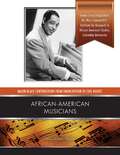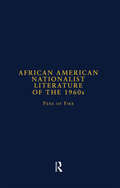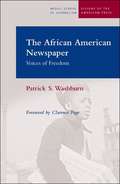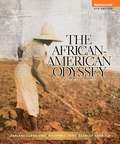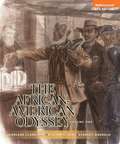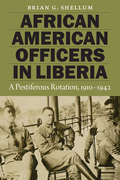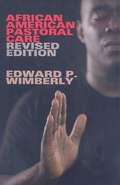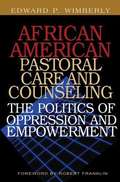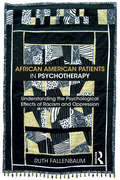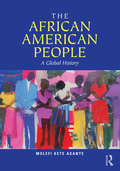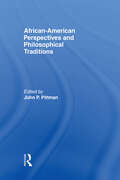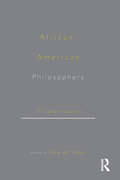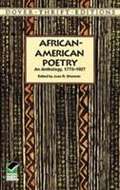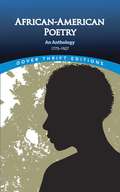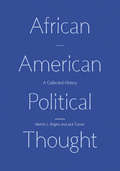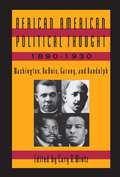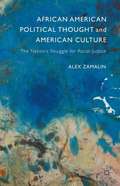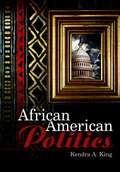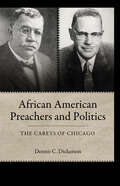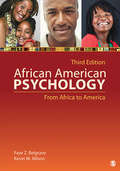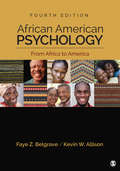- Table View
- List View
African American Musicians (Major Black Contributions from Emancipat)
by Claudette HegelAfrican Americans--famous and anonymous alike--have helped shape popular musical genres ranging from jazz and blues to rock 'n' roll and rap. This book provides a vivid account of that process, beginning with the work songs and spirituals of slaves and continuing up to the present. African-American Musicians tells the stories of figures such as bluesman Robert Johnson, whose guitar playing was so extraordinary that people said he must have made a deal with the devil; jazz great Duke Ellington, considered one of America's greatest composers and bandleaders; classical singer Marian Anderson, who struck a blow for civil rights with her music; Michael Jackson, the "King of Pop"; and many, many more.
African American Nationalist Literature of the 1960s: Pens of Fire (Studies in American Popular History and Culture)
by Sandra Hollin FlowersBringing together political theory and literary works, this study recreates the political climate which made the 1960s an unforgettable era for young black Americans. A chapter on "The Many Shades of Black Nationalism," for instance, explains: why black nationalism is known by more than a dozen different names; how events in Africa influenced black nationalism in America; why Malcolm X's death had a greater impact on nationalism than did his life; and how the United States government unwittingly became nationalism's ally. Another chapter explores the bitter feud between the dominant factions of the 1960s-cultural and revolutionary nationalists. This feud erupted in both verbal and armed warfare and generated an abundance of political theory and literary works, much of which is out of circulation but is examined in the study. Nationalist poetry, theater, and fiction are each treated in separate chapters which exemplify the aesthetic and political concerns of this memorable period in American history and letters. Aside from its unique combination of artistic and political works, what makes this book important is the current revival of nationalist sentiment in African American life and arts. Though this revival is closely identified with the nationalism of the 1960s, it lacks the focus of that period. This study explains what gave the nationalism of the 1960s its focus, how that focus was expressed in art forms, and why 1960s nationalism continues to influence the African American identity and will probably do so well into the twenty-first century.
The African American Newspaper: Voice of Freedom (Visions of the American Press)
by Patrick WashburnIn March of 1827 the nation's first black newspaper appeared in New York City--to counter attacks on blacks by the city's other papers. From this signal event, The African American Newspaper traces the evolution of the black newspaper--and its ultimate decline--for more than 160 years until the end of the twentieth century. <p><p> The book chronicles the growth of the black press into a powerful and effective national voice for African Americans during the period from 1910 to 1950--a period that proved critical to the formation and gathering strength of the civil rights movement that emerged so forcefully in the following decades. In particular, author Patrick S. Washburn explores how the Pittsburgh Courier and the Chicago Defender led the way as the two most influential black newspapers in U.S. history, effectively setting the stage for the civil rights movement's successes. Washburn also examines the numerous reasons for the enormous decline of black newspapers in influence and circulation in the decades immediately following World War II. His book documents as never before how the press's singular accomplishments provide a unique record of all areas of black history and a significant and shaping affect on the black experience in America.
The African-American Odyssey
by Darlene Clark Hine William C. Hine Stanley C. HarroldA compelling story of agency, survival, struggle and triumph over adversity More than any other text, The African-American Odyssey illuminates the central place of African-Americans in U. S. history by telling the story of what it has meant to be black in America and how African-American history is inseparably woven into the greater context of American history. From Africa to the 21st century, this book follows the long and turbulent journey of African-Americans, the rich culture they have nurtured throughout their history and the quest for freedom through which African-Americans have sought to counter oppression and racism. This text also recognizes the diversity within the African-American sphere, providing coverage of class and gender and balancing the lives of ordinary men and women with accounts of black leaders and the impact each has had on the struggle for freedom.
The African-American Odyssey Volume 1
by Darlene Clark Hine Stanley Harrold William Clark HineA compelling story of agency, survival, struggle and triumph over adversity More than any other text, The African-American Odyssey illuminates the central place of African-Americans in U. S. history by telling the story of what it has meant to be black in America and how African-American history is inseparably woven into the greater context of American history. From Africa to the 21st century, this book follows the long and turbulent journey of African-Americans, the rich culture they have nurtured throughout their history and the quest for freedom through which African-Americans have sought to counter oppression and racism. This text also recognizes the diversity within the African-American sphere, providing coverage of class and gender and balancing the lives of ordinary men and women with accounts of black leaders and the impact each has had on the struggle for freedom.
African American Officers in Liberia: A Pestiferous Rotation, 1910–1942
by Brian G. ShellumAfrican American Officers in Liberia tells the story of seventeen African American officers who trained, reorganized, and commanded the Liberian Frontier Force from 1910 to 1942. In this West African country founded by freed black American slaves, African American officers performed their duties as instruments of imperialism for a country that was, at best, ambivalent about having them serve under arms at home and abroad. The United States extended its newfound imperial reach and policy of “Dollar Diplomacy” to Liberia, a country it considered a U.S. protectorate. Brian G. Shellum explores U.S. foreign policy toward Liberia and the African American diaspora, while detailing the African American military experience in the first half of the twentieth century. Shellum brings to life the story of the African American officers who carried out a dangerous mission in Liberia for an American government that did not treat them as equal citizens in their homeland, and he provides recognition for their critical role in preserving the independence of Liberia.
African American Pastoral Care: Revised Edition
by Edward P. WimberlyRespond to God's unfolding drama to bring healing and reconciliation. In this major revision of his classic book, Dr. Edward Wimberly updates his narrative methodology by examining current issues in African American pastoral care and counseling.
African American Pastoral Care and Counseling: The Politics of Oppression and Empowerment
by Edward P. WimberlyAll of these iterations of modern faith seem errant and in need of correction. African American Pastoral Care and Counseling may be just what we needed at this hour in history.
African American Patients in Psychotherapy: Understanding the Psychological Effects of Racism and Oppression
by Ruth FallenbaumAfrican American Patients in Psychotherapy integrates history, current events, arts, psychoanalytic thinking, and case studies to provide a model for understanding the social and historical dimensions of psychological development across African American communities. Among the topics included are psychological consequences of slavery and Jim Crow, the black patient and the white therapist, the toll of even “small” racist enactments, the black patient’s uneasy relationship with health care providers, and a revisiting of the idea of “black rage.” Author Ruth Fallenbaum also examines the psychological potential of reparation for centuries of slave labor and legalized wage and property theft.
The African American People: A Global History
by Molefi Kete AsanteThe African American People is the first history of the African American people to take a global look at the role African Americans have played in the world. Author Molefi Kete Asante synthesizes the familiar tale of history's effect on the African people who found themselves forcibly part of the United States with a new look at how African Americans in later generations impacted the rest of the world. Designed for a range of students studying African American History or African American Studies, The African American People takes the story from Africa to the Americas, and follows the diaspora through the Underground Railroad to Canada, and on to Europe, Asia, and around the globe. Including over 50 images documenting African American lives, The African American People presents the most detailed discussion of the African and African American diaspora to date, giving student the foundation they need to broaden their conception of African American History.
African-American Perspectives and Philosophical Traditions
by John P. PittmanFirst published in 1997. Routledge is an imprint of Taylor & Francis, an informa company.
African American Perspectives on Political Science
by Rich Wilbur Hamilton CharlesRace matters in both national and international politics. Starting from this perspective, African American Perspectives on Political Science presents original essays from leading African American political scientists. Collectively, they evaluate the discipline, its subfields, the quality of race-related research, and omissions in the literature. They argue that because Americans do not fully understand the many-faceted issues of race in politics in their own country, they find it difficult to comprehend ethnic and racial disputes in other countries as well. In addition, partly because there are so few African Americans in the field, political science faces a danger of unconscious insularity in methodology and outlook. Contributors argue that the discipline needs multiple perspectives to prevent it from developing blind spots. Taken as a whole, these essays argue with great urgency that African American political scientists have a unique opportunity and a special responsibility to rethink the canon, the norms, and the directions of the discipline.
African-American Philosophers: 17 Conversations
by George YancyAfrican-American Philosophers brings into conversation seventeen of the foremost thinkers of color to discuss issues such as Black existentialism, racism, Black women philosophers within the academy, affirmative action and the conceptual parameters of African-American philosophy.
African American Pioneers of Sociology
by Pierre Saint-Arnaud Peter FeldsteinIn African American Pioneers of Sociology, Pierre Saint-Arnaud examines the lasting contributions that African Americans have made to the field of sociology. Arguing that science is anything but a neutral construct, he defends the radical stances taken by early African American sociologists from accusations of intellectual infirmity by foregrounding the racist historical context of the time these influential works were produced. Examining key figures such as W.E.B. Du Bois, Edward Franklin Frazier, Charles Spurgeon Johnson, Horace Roscoe Cayton, J.G. St. Clair Drake, and Oliver Cromwell Cox, Saint-Arnaudreveals the ways in which many aspects of modern sociology emerged from these authors' radical views on race, gender, religion, and class. Beautifully translated from its original French, African American Pioneers of Sociology is a stunning examination of the influence of African American intellectuals and an essential work for understanding the origins of sociology as a modern discipline.
African-American Poetry: An Anthology 1773-1927
by Joan R. ShermanRich selection of 74 poems ranging from the religious and moral verse of Phillis Wheatley Peters (ca. 1753-1784) to 20th-century work of Langston Hughes and Countee Cullen. Other contributors include James Weldon Johnson, Paul Laurence Dunbar, many others. Indispensable for students of the black experience in America and any lover of fine poetry. Includes 4 selections from the Common Core State Standards Initiative: "I, Too, Sing America," "Lift Every Voice and Sing," "Yet Do I Marvel," and "On Being Brought from Africa to America. "
African-American Poetry: An Anthology, 1773-1927 (Dover Thrift Editions)
by Joan R. ShermanIn the 19th century, abolitionist and African-American periodicals printed thousands of poems by black men and women on such topics as bondage and freedom, hatred and discrimination, racial identity and racial solidarity, along with dialect verse that mythologized the Southern past. Early in the 20th century, black poets celebrated race consciousness in propagandistic and protest poetry, while World War I helped engender the outpouring of African-American creativity known as the "Harlem Renaissance."The present volume spans this wealth of material, ranging from the religious and moral verse of Phillis Wheatley Peters (ca. 1753-1784) to the 20th-century sensibilities of Langston Hughes and Countee Cullen. Also here are works by George Moses Horton, Frances Ellen Watkins Harper, Alberry Alston Whitman, Henrietta Cordelia Ray, Daniel Webster Davis, Mary Weston Fordham, James Weldon Johnson, Paul Laurence Dunbar, and many more.Attractive and inexpensive, this carefully chosen collection offers unparalleled insight into the hearts and minds of African-Americans. It will be welcomed by students of the black experience in America and any lover of fine poetry.Includes 4 selections from the Common Core State Standards Initiative: "I, Too, Sing America," "Lift Every Voice and Sing," "Yet Do I Marvel," and "On Being Brought from Africa to America."
African-American Political Psychology
by Tasha S. Philpot Ismail K. WhiteThis volume addresses questions such as: How do the unique experiences of Blacks in America influence their political psychology? What are the psychological mechanisms underlying Blacks' orientation toward politics and can these mechanisms help account for observed differences in Black political attitudes and behavior?
African American Political Thought: A Collected History
by Jack Turner Melvin L. RogersAfrican American Political Thought offers an unprecedented philosophical history of thinkers from the African American community and African diaspora who have addressed the central issues of political life: democracy, race, violence, liberation, solidarity, and mass political action. Melvin L. Rogers and Jack Turner have brought together leading scholars to reflect on individual intellectuals from the past four centuries, developing their list with an expansive approach to political expression. The collected essays consider such figures as Martin Delany, Ida B. Wells, W. E. B. Du Bois, James Baldwin, Toni Morrison, and Audre Lorde, whose works are addressed by scholars such as Farah Jasmin Griffin, Robert Gooding-Williams, Michael Dawson, Nick Bromell, Neil Roberts, and Lawrie Balfour. While African American political thought is inextricable from the historical movement of American political thought, this volume stresses the individuality of Black thinkers, the transnational and diasporic consciousness, and how individual speakers and writers draw on various traditions simultaneously to broaden our conception of African American political ideas. This landmark volume gives us the opportunity to tap into the myriad and nuanced political theories central to Black life. In doing so, African American Political Thought: A Collected History transforms how we understand the past and future of political thinking in the West.
African American Political Thought, 1890-1930: Washington, Du Bois, Garvey and Randolph
by Cary D. WintzThis text presents a selection of essays and speeches written between 1890 and 1930 by Booker T. Washington, W.E.B. Du Bois, A. Philip Randolph and Marcus Garvey. The work analyses African-American political thought, defining the options confronting African Americans in the 20th century.
African American Political Thought and American Culture: The Nation's Struggle For Racial Justice
by Alex ZamalinThis book demonstrates how certain African American writers radically re-envisioned core American ideals in order to make them serviceable for racial justice. Each writer's unprecedented reconstruction of key American values has the potential to energize American citizenship today.
African American Politics (Us Minority Politics #6)
by Kendra KingAfrican-American Politics is a cutting-edge introduction to the political successes, failures, and persistent challenges of African-American political participation in the United States. Exploring both historic and present day political phenomena, the book draws on a wide range of sources, including U.S. Census data, Gallup Polls, landmark court opinions, speeches and first-hand interviews to provide the reader with a comprehensive and up-to-the-minute analysis of what often appear to be "irreconcilable differences" between the American political system and one of its most historically subjugated constituency groups.
African American Preachers and Politics: The Careys of Chicago (Margaret Walker Alexander Series in African American Studies)
by Dennis C. DickersonDuring most of the twentieth century, Archibald J. Carey, Sr. (1868–1931) and Archibald J. Carey, Jr. (1908–1981), father and son, exemplified a blend of ministry and politics that many African American religious leaders pursued. Their sacred and secular concerns merged in efforts to improve the spiritual and material well-being of their congregations. But as political alliances became necessary, both wrestled with moral consequences and varied outcomes. Both were ministers to Chicago's largest African Methodist Episcopal Church congregations—the senior Carey as a bishop, and the junior Carey as a pastor and an attorney. Bishop Carey associated himself mainly with Chicago mayor William Hale Thompson, a Republican, whom he presented to black voters as an ally. When the mayor appointed Carey to the city's civil service commission, Carey helped in the hiring and promotion of local blacks. But alleged impropriety for selling jobs marred the bishop's tenure. The junior Carey, also a Republican and an alderman, became head of the panel on anti-discrimination in employment for the Eisenhower administration. He aided innumerable black federal employees. Although an influential benefactor of CORE and SCLC, Carey associated with notorious FBI director J. Edgar Hoover and compromised support for Martin Luther King, Jr. Both Careys believed politics offered clergy the best opportunities to empower the black population. Their imperfect alliances and mixed results, however, proved the complexity of combining the realms of spirituality and politics.
African American Psychology: From Africa to America
by Dr Faye Z. Belgrave Dr Kevin W. AllisonAfrican American Psychology: From Africa to America provides students with comprehensive coverage of African American psychology as a field. Authors Faye Z. Belgrave and Kevin W. Allison expertly convey the integration of African and American influences on the psychology of African Americans. They illustrate how this group’s contemporary values, beliefs, and behaviors are derived from African culture and translated by the cultural socialization experiences of African Americans in this country. The text provides examples of evidence-based practices for improving well-being among African American communities, and addresses key methodological and research issues that are relevant to conducting research in this field. Each chapter of the text further addresses a contemporary issue of African Americans and provides a critical analysis of literature and research on select topics.
African American Psychology: From Africa to America
by Faye Z. Belgrave Kevin W. AllisonAfrican American Psychology: From Africa to America, Fourth Edition provides comprehensive coverage of the field of African American psychology. Authors Faye Z. Belgrave and Kevin W. Allison skillfully convey the integration of African and American influences on the psychology of African Americans using a consistent theme throughout the text—the idea that understanding the psychology of African Americans is closely linked to understanding what is happening in the institutional systems in the United States. The Fourth Edition reflects notable advances and important developments in the field over the last several years, and includes evidence-based practices for improving the overall well-being of African American communities. New to the Fourth Edition Coverage of current issues affecting African Americans and causing changes in the social-political environment include the Black Lives Matter movement, racial trauma, and more. Content from blogs has been added to chapter-opening cover stories to reflect the more modern ways news and information are obtained. More coverage of literature and research on Blacks throughout the diaspora, especially in Africa, provide historical context and documents heterogeneity among African Americans in the United States. Expanded coverage of topics as a result of recent research includes LGBTQ individuals, African American fathers, colorism, intersectionality, electronic cigarettes, social media, and more.
African American Psychology: From Africa to America
by Faye Z. Belgrave Kevin W. AllisonAfrican American Psychology: From Africa to America, Fourth Edition provides comprehensive coverage of the field of African American psychology. Authors Faye Z. Belgrave and Kevin W. Allison skillfully convey the integration of African and American influences on the psychology of African Americans using a consistent theme throughout the text—the idea that understanding the psychology of African Americans is closely linked to understanding what is happening in the institutional systems in the United States. The Fourth Edition reflects notable advances and important developments in the field over the last several years, and includes evidence-based practices for improving the overall well-being of African American communities. New to the Fourth Edition Coverage of current issues affecting African Americans and causing changes in the social-political environment include the Black Lives Matter movement, racial trauma, and more. Content from blogs has been added to chapter-opening cover stories to reflect the more modern ways news and information are obtained. More coverage of literature and research on Blacks throughout the diaspora, especially in Africa, provide historical context and documents heterogeneity among African Americans in the United States. Expanded coverage of topics as a result of recent research includes LGBTQ individuals, African American fathers, colorism, intersectionality, electronic cigarettes, social media, and more.
